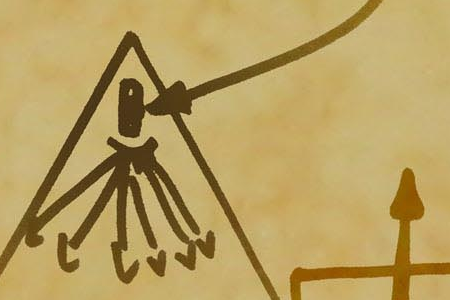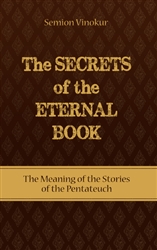
The Creator created only one desire—to enjoy. However, this desire is so all-encompassing that bringing us all to the end goal right away is impossible. After all, we’re talking about infinite bliss, which is precisely the goal of man’s creation. So instead, it is done in phases because the desire to enjoy within us divides into myriad smaller desires. By correcting them one at a time, progressing from “easy” to “difficult,” we will achieve infinite bliss, the absolute and everlasting fulfillment prepared for us by the Creator.
For those in whom the point in the heart (the striving for spiritual pleasure) has awakened, working with one’s desires becomes a fascinating journey into the Upper World.
Becoming the Ruler Over all Desires
“And God said: ‘Let us make man in our image, after our likeness; and let them have dominion over the fish of the sea, and over the fowl of the air, and over the cattle, and over all the earth, and over every creeping thing that creeps upon the earth.’ And God created man in His own image, in the image of God created He him; male and female created He them.”
In other words, inside of you, a “human” is born to rule over all other desires: “And let them rule over the fish of the sea and over the birds of the sky and over the cattle and over all the earth, and over every creeping thing that creeps on the earth.” All these desires were created exclusively for man.
The “human” inside you is destined to walk a difficult path before he realizes that ruling over them doesn’t mean using them for his benefit, for it only harms him and the world. Quite the contrary, these desires must be used exclusively to others’ delight, because with respect to the desires of others, all of us are always free, able to clearly separate ourselves from each other.
The Inanimate, Vegetative and Animate Desires
Before “the birth of a human within you,” you were filled only with the inanimate, vegetative, and animate desires.
An inanimate desire is when you want only one thing—to be still and not think of anything, like a rock by the wayside, totally passive, with only a single thought: “Leave me alone.”
A vegetative desire is when you react to external stimuli, but are not yet able to move from your place, as if tied to the ground (by egoism).
You begin to ask yourself questions like, “Why do I suffer?” You aspire for the Light, wishing to be “watered.” You are concerned only with your own growth, you consume, you are no longer a rock—and that is progress.
An animate desire implies movement and searching for subsistence. At this stage you may connect with others like you, and band into a pack because together it will be easier to acquire food. You are concerned with breeding and raising your progeny.
And then, suddenly, inside of you emerges the most complex and exalted desire that comprises all the others, called the “Man within us.”
Man in the Image of the Creator
The word “man” in Hebrew is “Adam.”
“Adam” derives from the word Domeh—similar, alike, similar to the Creator.
It follows that only one who aspires to be like the Creator, to take on His qualities and to be born spiritually, can be called Adam (“man,” similar to the Creator).
The Creator’s qualities are pure bestowal, absolute and unconditional love.
A certain point named “Adam” or “the point in the heart” has awakened within you. This point is one with the Creator and wants to be like Him because He is its root.
There exists an apparatus of the Upper Governance, in charge of all the souls, their paths and order of correction. This managing apparatus is directly connected to man’s point in the heart, the Adam in you.
What is the purpose of this apparatus? It will provide you with the information about the program of Creation, the path you must traverse. Without it you cannot know what to do, what your next step should be, or what is required of you.
In order for you to acquire the qualities necessary to advance, the Upper Degree must teach you exactly what you need to do and how to do it. For this reason it issues this auxiliary device called Tzelem (image).
This device is implanted in the soul, where it activates all the necessary corrections. This is why it is written that man (Adam) is made in the Creator’s image.
 “Eternal Life through the Middle Line by the Study of Kabbalah” is based on the book, The Secrets of the Eternal Book: The Meaning of the Stories of the Pentateuch by Semion Vinokur.
“Eternal Life through the Middle Line by the Study of Kabbalah” is based on the book, The Secrets of the Eternal Book: The Meaning of the Stories of the Pentateuch by Semion Vinokur.

IT IS HARD TO ACCEPT THE IDEA THAT THE CREATOR ONLY WANTS US TO ENJOY AND ACHIEVE ETERNAL BLISS, ESPECIALLY WHEN WE LOOK AT OUR LIVES IN THIS WORLD. INDEED YOU MAY CONCLUDE THAT GOD WANTS ME TO SUFFER AND DIE AND IN BETWEEN BIRTH AND DEATH,HAVE A BAD TIME OF IT! BUT WHEN YOU THINK AGAIN, THIS SEEMS RIGHT.WHAT ESLSE WOULD GOD WANT FOR US? EVERY ARTIST WANTS HIS/HER SONG,PICTURE OR WRITING TO SHINE AND TURN OUT WELL.
I have thought of this idea many times and I have come to the conclusion that if we experienced any state, bliss, joy whatever, continuously it would value would wane. We evaluate life based on comparisons.
In other words, if we never experience pain or discomfort, we are unable to appreciate joy/bliss. Feeling one way, regardless of what it is, looses value over time.
I have thought of this idea many times and I have come to the conclusion that if we experienced any state, bliss, joy whatever, continuously it’s value would wane. We evaluate life based on comparisons.
In other words, if we never experience pain or discomfort, we are unable to appreciate joy/bliss. Feeling one way, regardless of what it is, looses value over time.